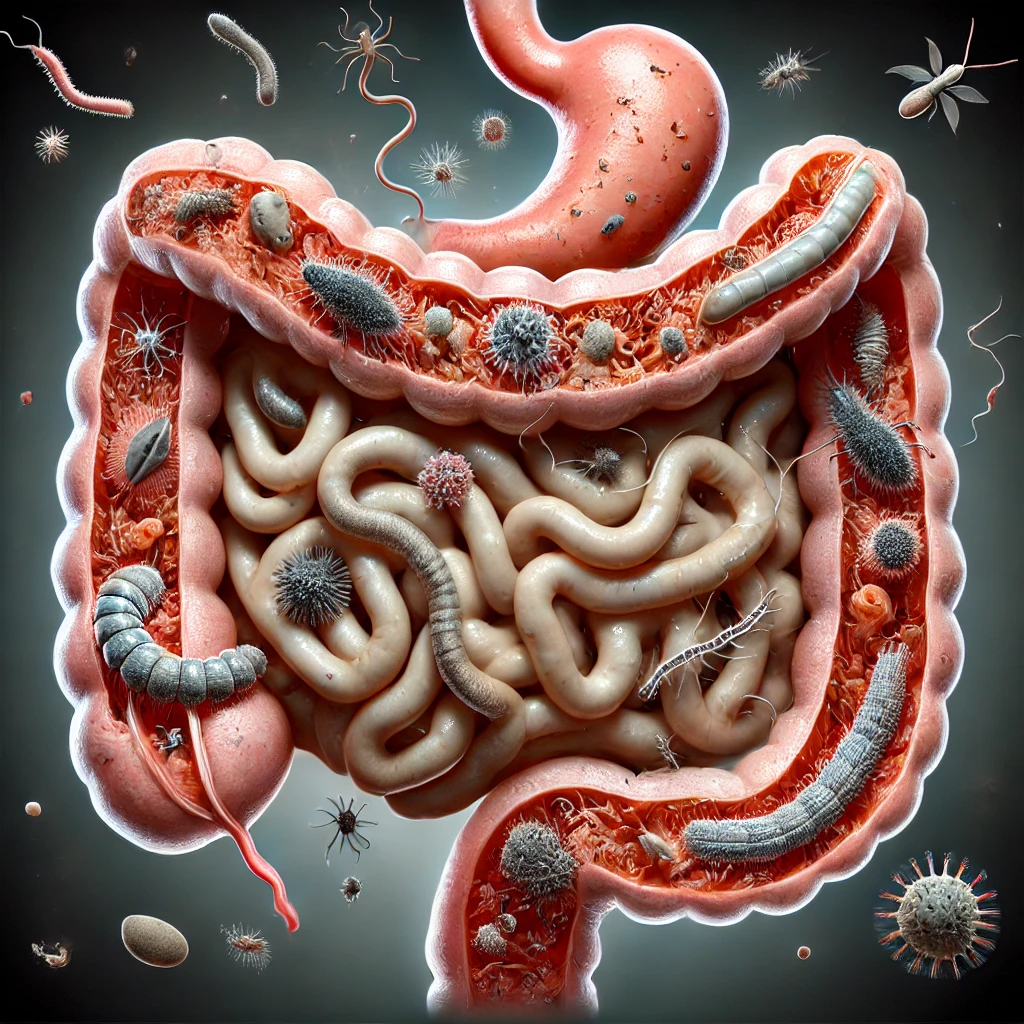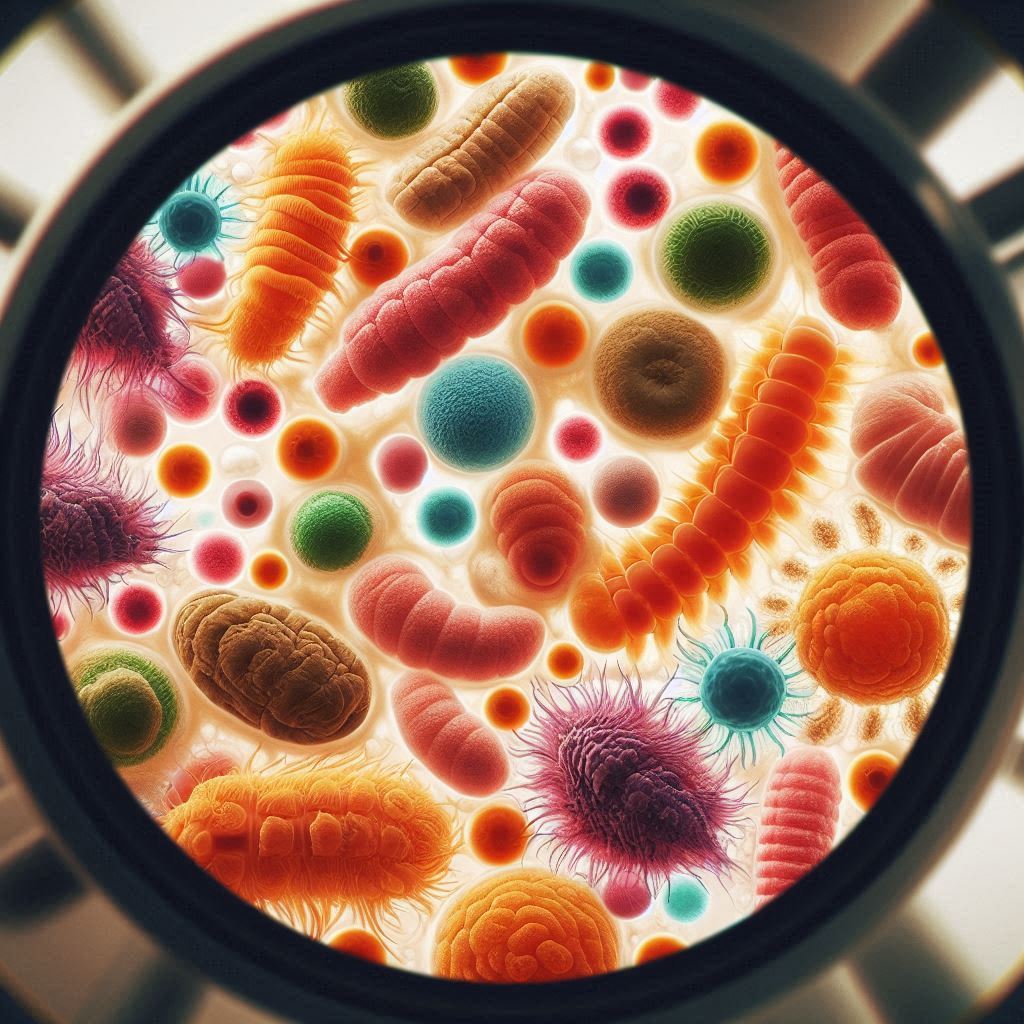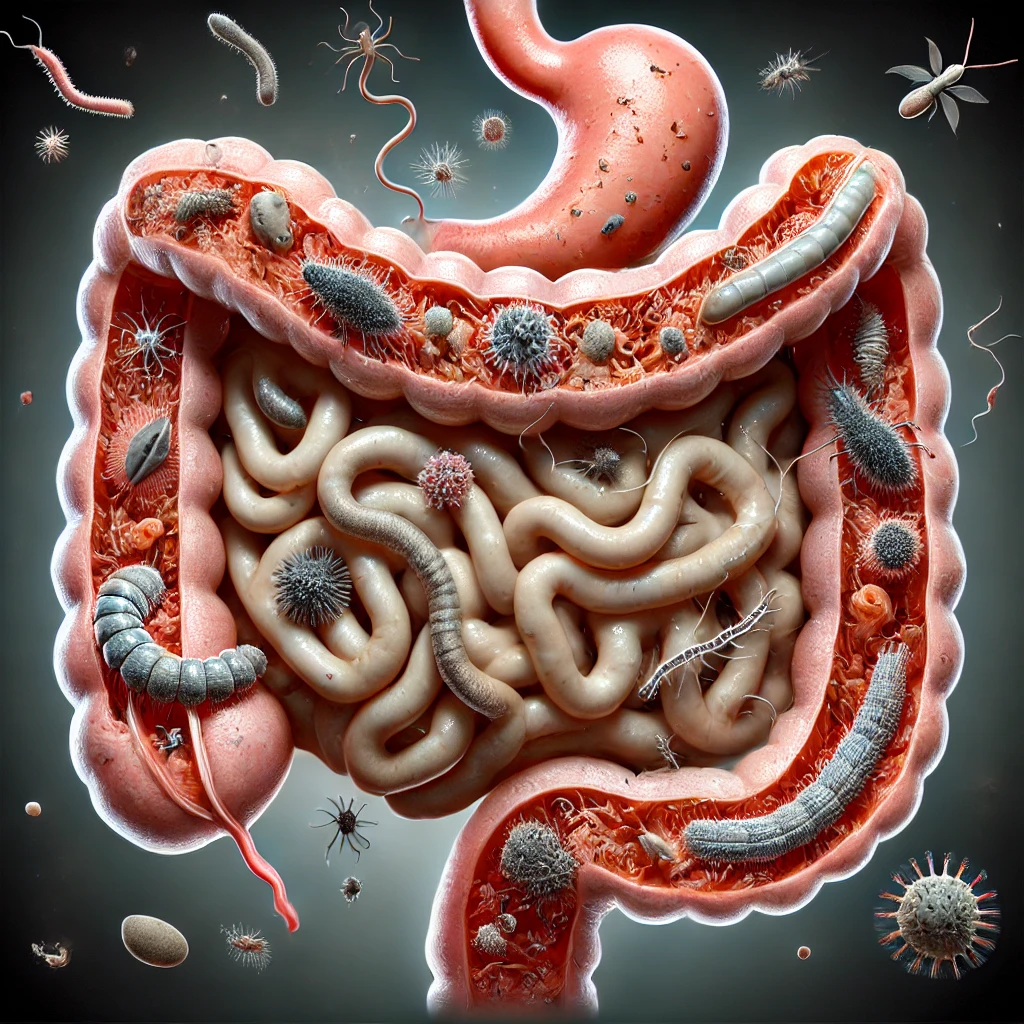
What Are Intestinal Parasites?
Intestinal parasites live in your digestive system, causing infections and sometimes leading to serious health complications. These organisms can range from microscopic protozoa to giant worms like helminths. While many think parasites are only found in underdeveloped countries, they can be seen globally and affect anyone.
- Helminths (Parasitic Intestinal Worms:
Helminths include pinworms, hookworms, whipworms, and tapeworms. These worm-like parasites invade the intestines and can cause various health issues, ranging from mild discomfort to severe complications if left untreated. Tapeworms can live for years and absorb nutrients from their hosts, leading to malnutrition and other health problems.
- Protozoa:
Protozoan parasites like Giardia and Cryptosporidium are microscopic and often contracted through contaminated water. These parasites can multiply within the host, causing diarrhea, nausea, and other gastrointestinal symptoms. Though small, they can cause severe illness, especially in individuals with weakened immune systems.
Most Common Intestinal Parasite
Ascaris lumbricoides is the most common intestinal parasite, affecting over a billion people, especially in tropical regions.
Giardia and pinworms are more prevalent in developed countries due to better sanitation. However, they are still a concern, especially for travelers or individuals exposed to contaminated water or poor hygiene practices.
Regardless of the type, intestinal parasites often lead to similar symptoms, such as:
- Diarrhea
- Abdominal pain and bloating
- Nausea
- Fatigue
- Weight loss
- Itching around the anus (common with pinworms)
Some people may carry parasites without showing obvious symptoms, but any of these could indicate an infection that needs attention.
How Parasites Affect the Gut Microbiome
Parasites can upset the balance of your gut microbiome, leading to gut dysbiosis. Gut dysbiosis refers to an imbalance in the gut’s bacterial ecosystem, which can lead to digestive and immune-related problems. While parasites can cause gut damage, they can also create an imbalance between harmful and beneficial bacteria, triggering digestive problems like IBS, inflammatory bowel disease, and autoimmune issues.
Some research also suggests that while parasites can cause gut damage, they might also modulate immune responses, potentially reducing the risks of autoimmune conditions like allergies or eczema.
Complications of Intestinal Parasites
Severe infections can result in chronic diarrhea, malnutrition, and damage to the intestinal lining. Additionally, parasites like Giardia can disrupt the gut microbiome, leading to conditions like irritable bowel syndrome (IBS) and chronic fatigue.
Do Intestinal Parasites Show Up in Poop or the Toilet?
Yes, some intestinal parasites are visible in stool or toilet water. Tapeworm segments and pinworms can resemble small rice grains or thin worms in stool. However, microscopic parasites like Giardia won’t be visible without testing.
What Causes Intestinal Parasitic Infections?
Parasitic infections are primarily caused by ingesting contaminated food or water, poor hygiene, or contacting infected soil or surfaces. Eating undercooked meat and walking barefoot in areas with contaminated soil are also common causes.
Risk Factors
Living or traveling in areas with poor sanitation, consuming undercooked meat, and drinking contaminated water significantly increase your risk of contracting intestinal parasites.
What Happens If Intestinal Parasites Go Untreated?
Untreated parasitic infections can lead to malnutrition, chronic diarrhea, and significant damage to the digestive tract. Some parasites, like hookworms, can cause anemia by feeding on the host’s blood.
How Are Intestinal Parasites Diagnosed?

Doctors often analyze stool samples under a microscope to detect the presence of parasite eggs or cysts. In more severe cases, imaging like X-rays or ultrasounds may be necessary to locate larger parasitic infections. If you suspect an infection, it’s essential to seek medical advice.
What Is the Treatment for Intestinal Parasites?
Conventional Treatment
Anti-parasitic medications such as Albendazole are commonly prescribed to treat helminth infections, while Metronidazole is typically used for protozoan infections like Giardia.
A meta-analysis of eight randomized clinical trials involving 900 patients compared Albendazole with Metronidazole to treat giardiasis. The findings revealed that Albendazole was as effective as Metronidazole, with fewer side effects.
Natural and Holistic Remedies for Gut Parasites:
For those seeking a more natural approach, various herbal and holistic treatments show promise:
| Remedy | How It Works | Supporting Study |
|---|---|---|
| Garlic | Contains antimicrobial properties that combat parasites. | Journal of Helminthology found garlic extract significantly reduced intestinal worms in trials. |
| Pumpkin Seeds | Rich in cucurbitacin, which paralyzes parasites, helping expel them from the gut. | Research in the International Journal of Molecular Sciences shows effectiveness against tapeworms. |
| Wormwood | Traditionally used to treat intestinal worms; reduces parasite numbers in the host. | A study in Parasitology Research demonstrated its effectiveness in infected animals. |
| Papaya Seeds | Helps eliminate parasites; shown to reduce parasitic infections in children. | Studies showed that children treated with papaya seed extract saw significant reductions in parasitic infections. |
| Probiotics | Supports gut health by balancing the microbiome, reducing inflammation after infections. | Gut Microbes research emphasizes the role of probiotics in maintaining gut health after parasitic infections. |
- Garlic
Known for its antimicrobial properties, garlic has been used for centuries to combat parasites. A study in the *Journal of Helminthology* found that garlic extract significantly reduced intestinal worms in animal and human trials.
- Pumpkin Seeds:
These are rich in cucurbitacin, a compound that paralyzes parasites, helping to expel them from the digestive tract. Research published in the International Journal of Molecular Sciences confirms their effectiveness against tapeworms.
- Wormwood:
Wormwood, frequently used with black walnut and clove, has been a staple in traditional medicine for treating intestinal worms. A study in Parasitology Research shows that wormwood extract reduces the number of parasites in infected animals.
- Papaya Seeds:
These studies suggest that papaya seeds may help eliminate intestinal parasites, as children treated with papaya seed extract showed significant reductions in parasitic infections.
- Probiotics:
Probiotics like Lactobacillus and Bifidobacterium support gut health by improving the gut microbiome’s balance, reducing inflammation, and potentially lowering the impact of parasites. Research in *Gut Microbes* emphasizes probiotics’ role in maintaining gut health after parasitic infections.
How Do You Prevent Intestinal Parasites?
Prevention methods include:
- Practicing good hygiene, like frequent handwashing
- Thoroughly cooking meat
- Drinking clean water and avoiding contaminated sources
- Wearing shoes outdoors to prevent contact with infected soil
Parasite Cleanses vs. Medication
Anti-parasitic medications are fast-acting and well-researched, but they can come with side effects like nausea or digestive upset. Herbal cleanses containing ingredients like wormwood, or black walnut is gentler alternatives, though their effectiveness is less scientifically supported. Consulting a healthcare professional before attempting a cleanse is essential, especially for those with existing health conditions or on medications.
In Conclusion
Intestinal parasites can cause various health issues, from gut dysbiosis and digestive problems to more severe conditions like malnutrition and chronic diarrhea. Common parasites like Giardia and Ascaris disrupt the gut microbiome, leading to symptoms like diarrhea, fatigue, and abdominal pain.
Both conventional treatments like Albendazole and natural remedies such as garlic, pumpkin seeds, and probiotics can be effective. Preventing infection involves practicing good hygiene, drinking clean water, and cooking meat thoroughly. Taking early action is key to avoiding serious complications.

